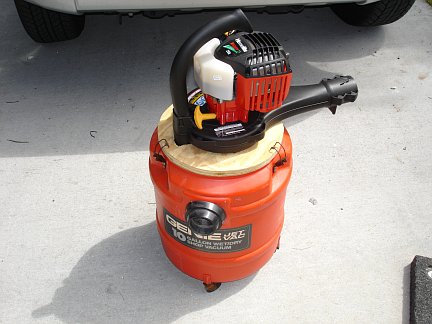 One of my many hobbies is recreational gold prospecting. I've been gold panning on my vacations for many years. It's a lot
of fun. It's great exercise. I get to do it in really scenic locations. I have even found some gold. Gold likes to collect
in cracks and crevasses and really hard to get at nooks and crannies. What is really needed to clean out those pesky cracks
and crevasses is a vacuum cleaner. Problem is, where do you plug it in out in the wilderness? Solution, replace the electric
motor with a gasoline engine. Now you have a vacuum cleaner that will work anywhere.
One of my many hobbies is recreational gold prospecting. I've been gold panning on my vacations for many years. It's a lot
of fun. It's great exercise. I get to do it in really scenic locations. I have even found some gold. Gold likes to collect
in cracks and crevasses and really hard to get at nooks and crannies. What is really needed to clean out those pesky cracks
and crevasses is a vacuum cleaner. Problem is, where do you plug it in out in the wilderness? Solution, replace the electric
motor with a gasoline engine. Now you have a vacuum cleaner that will work anywhere.
As with most of my other equipment, (recirculating sluice,
wind turbine,
solar panel,
telescopes,
jet engine, etc., etc.), I decided to try building
one myself, rather than just buying one. The tinkering is half the fun after all. Also, you will get a much greater sense of
satisfaction and accomplishment when you know it is YOUR home-built equipment that is doing such a good job, and not some
store-bought thing.
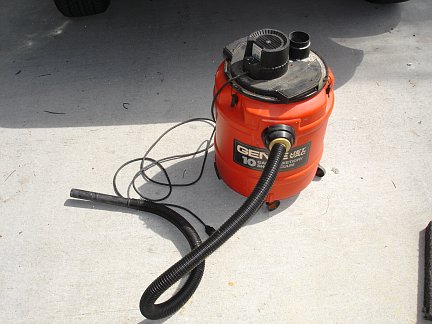 The first step in the process is acquiring a small, wet/dry vac cheap. I found one at a yard sale. It was in pretty bad shape.
The guy swore it worked though. I didn't really care if it worked or not because I was going to take the electric motor off
anyway, but I didn't tell him that. I kept talking him down in price because of how beat-up it was. Eventually I got it for $5.
The first step in the process is acquiring a small, wet/dry vac cheap. I found one at a yard sale. It was in pretty bad shape.
The guy swore it worked though. I didn't really care if it worked or not because I was going to take the electric motor off
anyway, but I didn't tell him that. I kept talking him down in price because of how beat-up it was. Eventually I got it for $5.
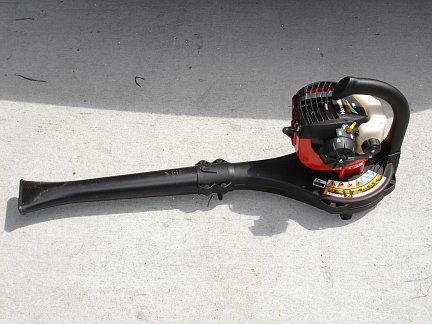 Now I needed a gas engine. Well I already had a leaf blower. It is engine and blower unit in one. That's half of a vacuum
cleaner right there. All I needed to add was a tank and a hose, and the wet dry/vac I just bought had them.
Now I needed a gas engine. Well I already had a leaf blower. It is engine and blower unit in one. That's half of a vacuum
cleaner right there. All I needed to add was a tank and a hose, and the wet dry/vac I just bought had them.
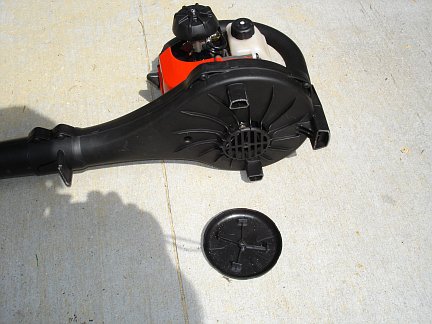 I removed the nozzle extension and the intake diffuser from the leaf blower. This turns it into quite a compact unit.
They just snap right back on when I need to do lawn work.
I removed the nozzle extension and the intake diffuser from the leaf blower. This turns it into quite a compact unit.
They just snap right back on when I need to do lawn work.
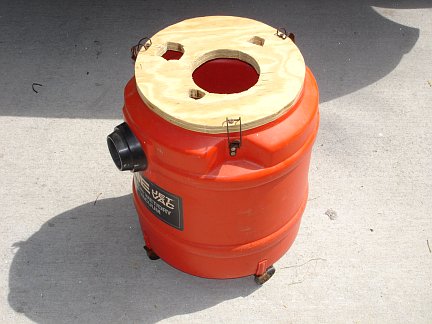 I removed the electric motor and blower unit from the wet/dry vac and contemplated how to attach the leaf blower in its
place. I cut a disk of plywood that would fit over the top of the wet/dry vac's tank. I put three screws in with their
heads sticking up a little for the hold-down clips on the tank to get a grip on.
I removed the electric motor and blower unit from the wet/dry vac and contemplated how to attach the leaf blower in its
place. I cut a disk of plywood that would fit over the top of the wet/dry vac's tank. I put three screws in with their
heads sticking up a little for the hold-down clips on the tank to get a grip on.
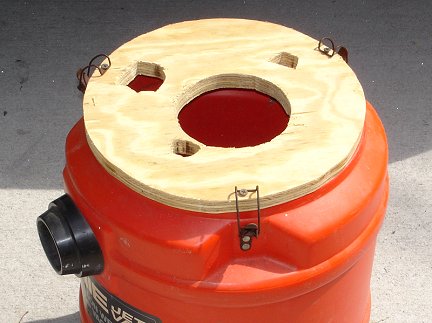 Then I cut holes in it to accommodate the leaf blower. I not only needed a hole for the leaf blower's air intake, but
also holes for various protruding pieces that would otherwise be in the way. I got some thick, adhesive-backed weather
stripping at my local home center store and used it to ensure an air-tight seal between the leaf blower and the wood disk.
Then I cut holes in it to accommodate the leaf blower. I not only needed a hole for the leaf blower's air intake, but
also holes for various protruding pieces that would otherwise be in the way. I got some thick, adhesive-backed weather
stripping at my local home center store and used it to ensure an air-tight seal between the leaf blower and the wood disk.
|
Click to learn how
to meet them
|
|
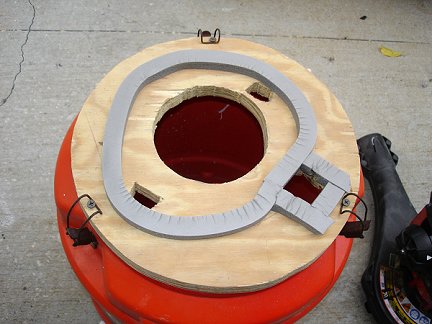 I got some thick, adhesive-backed weather stripping at my local home center store and used it to ensure an air-tight seal
between the leaf blower and the wood disk. Caulking would probably work better, but I wanted to be able to remove the blower
easily when I needed it for yard work. If you have a leaf blower you are willing to permanently dedicate to this application,
then caulking is probably the way to go.
I got some thick, adhesive-backed weather stripping at my local home center store and used it to ensure an air-tight seal
between the leaf blower and the wood disk. Caulking would probably work better, but I wanted to be able to remove the blower
easily when I needed it for yard work. If you have a leaf blower you are willing to permanently dedicate to this application,
then caulking is probably the way to go.
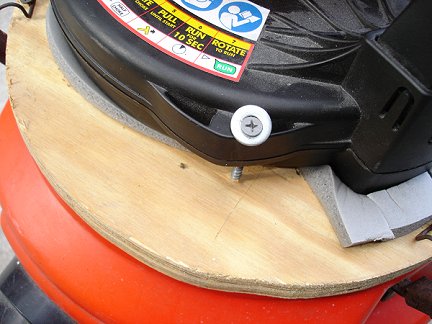 I used long wood screws and washers to hold the blower down on the wood disk. My model of leaf blower has convenient tabs
on the edges to run the screws through. It only takes a couple of minutes and a
screwdriver to free it up when I have to use it for yard work.
I used long wood screws and washers to hold the blower down on the wood disk. My model of leaf blower has convenient tabs
on the edges to run the screws through. It only takes a couple of minutes and a
screwdriver to free it up when I have to use it for yard work.
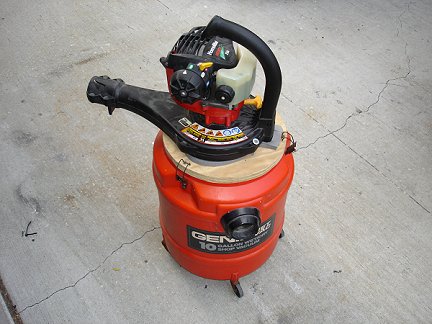 There is the "finished" product. There are a couple of issues that
still need ironing out. I need to put handles on it somehow so I can pick it up easily when it is full of dirt. Picking it up
by the leaf blower handle isn't going to work. Also, there is no automatic shutdown mechanism when the tank is full like the
original electric unit had. I'll just have to keep an eye on the level of material in it.
I can't wait to take it out in the field and give it a try.
There is the "finished" product. There are a couple of issues that
still need ironing out. I need to put handles on it somehow so I can pick it up easily when it is full of dirt. Picking it up
by the leaf blower handle isn't going to work. Also, there is no automatic shutdown mechanism when the tank is full like the
original electric unit had. I'll just have to keep an eye on the level of material in it.
I can't wait to take it out in the field and give it a try.
Note: If you build one of these, I highly recommend you use
ear protection while running it. It is very loud and the hose isn't long enough to allow you to get too far away from it.
|
Click to learn how
to meet them
|
|
